The Business Creativity Module (BCM) [E_CEP]
The Business Creativity Module (BCM) [E_CEP]
The Business Creativity Module (BCM) [E_CEP]
You also want an ePaper? Increase the reach of your titles
YUMPU automatically turns print PDFs into web optimized ePapers that Google loves.
SYLLABUS<strong>The</strong> <strong>Business</strong> <strong>Creativity</strong> <strong>Module</strong> (<strong>BCM</strong>) [E_<strong>CEP</strong>]Summer term 2013Předpoklady:<strong>The</strong> <strong>Business</strong> <strong>Creativity</strong> <strong>Module</strong> (<strong>BCM</strong>) is an innovative European Union sponsored unit,jointly offered by some European Higher Education institutions in Scotland, the CzechRepublic, Germany, Poland and Estonia etc... Students will form teams known as CreativeVenture Teams (CVT) across the institutions, with the teams working jointly on a virtual‘same time’ platform.Cíl kurzu:<strong>The</strong> aim of the unit is to assist students in the bridging process between their specific areas ofstudy and the workplace through the creation of a viable entrepreneurial idea (for a newcompany, product or service) or a viable new solution to an existing problem having inmind from the start the European market. In this bridging process, it is anticipated that theimportance of the creative process will be emphasised and that students will experience manyof the factors involved in developing a new entrepreneurial concept of pan-European interest.Anotace / Obsah předmětu:Each Creative Venture Team is required to identify a new entrepreneurial idea around whichthey can build a new business or solution. It can be an opportunity for a new business or avariant of an existing business or a new institution or challenge in social entrepreneurship.For the purpose of this project a new entrepreneurial idea is:“An entrepreneurial concept involving a manufactured product or service, process,solution, institution or social innovation, which is initiated, controlled and developedthrough the efforts of the Creative Venture team.”<strong>The</strong> new idea does not have to be based around an entirely new product or service (although itmay be) and may instead be associated with an existing product/service being launched into anew market. <strong>The</strong> emphasis is on the development of pan-European ideas and this may involvespreading an existing product or service into countries or market places where the equivalentis not available.<strong>The</strong> course includes active participation of students in the analysis and interpretation ofcurrent topics. <strong>The</strong> course is conducted entirely in English.Osnova:1. Introduction to course2. Leadership, group dynamics and networks3. <strong>The</strong> Significance of European Cultural <strong>Creativity</strong>4. Creative problem solving and innovation5. Entrepreneurial Models
6. Idea generation 17. Opportunity Recognition and the Screening Process8. Market research9. New Product Development process10. Intercultural competencies and Euro-preneurship Strategies11. Critical thought processes and the creative personality12. Entrepreneurial personality & critical thinking CM13. Presentation skills: making successful pitches14. Entrepreneurial marketing strategies15. Idea Check Up (2)16. Student presentationsPLEASE NOTE: active participation in lectures 85% of presence minimumMandatory reading:• Von Stamm, B. 2008. Managing Innovation, Design and <strong>Creativity</strong>. 2nd Edition,WileyRecommended reading:• Deakins, D and Freel, M. 2009. Entrepreneurship and Small Firms. 5th Edition,McGraw Hill.• Von Stamm, B. 2008. Managing Innovation, Design and <strong>Creativity</strong>. 2nd Edition,Wiley.• Kuratko, D, & Hodgetts, M 1995 Entrepreneurship: <strong>The</strong>ory, Process and PracticeThomson• Burns, P 2007 Entrepreneurship and Small Firms 2 nd ed. Palgrave Macmillan• Coad, A & Rao, R 2009 Innovation and firm growth in high-tech sectors.• WILSON, A., 2006 Marketing Research: An Integrated Approach 2 nd ed.Harlow:Prentice Hall.• KENT, R., 2007 Marketing Research: Approaches, methods and Applications.London: Thomson• MCGIVERN, Y.,2006 & 2009 <strong>The</strong> Practice of Market Research. Harlow:PrenticeHall.Chapter• SHIU, E., HAIR, J., BUSH, R. & ORTINAU, D. 2009 Marketing Research.Maidenhead: McGraw Hill• KOLB, BONITA. 2008. Marketing Research: A Practical Approach. London: Sage• Burns, P 2007 Entrepreneurship and Small <strong>Business</strong> 2 nd ed. Palgrave• Barringer, B & Ireland, D 2006 Entrepreneurship: Successfully Launching NewVentures 2nd ed. Prentice Hall• Trott, P 2008 Innovation management and New Product Development 4th ed.Harlow:Prentice Hall• Deakins, D and Freel, M. 2009. Entrepreneurship and Small Firms. 5th Edition,McGraw Hill. KAPLAN, J 2009 Patterns of entrepreneurship. 3 rd ed. New Jersey:Wiley & Sons• Bygrave, W & Zacharakis A, 2010 <strong>The</strong> portable MBA in Entrepreneurship.
Výuka:A series of lectures will follow allowing all participating students to understand creativetechniques and recognise the significance of the creative process, with recorded lecturesprovided from last years session to allow international students to access the same materials intheir own locations.Students will arrange themselves into groups of two or three so that they may be grouped withother students in the module studying in our partnering European institutions. <strong>The</strong>se groupswill have opportunities to liaise with team members from the other participating institutionsthrough virtual means. <strong>The</strong>y can make use of the Skype facilities provided (a lab session willbe held early on in the module to explain how these work) or alternatively make contact usingtools such as MSN/Facebook/e-mail, preferably on a weekly basis. Students will arrange theirown team discussions after the Skype session.<strong>The</strong> lessons will have a lecturing part (theory, new knowledge including practical examples)and a practical part. Part of the lessons may be also designed as a preparation of the teampresentation project.Metody hodnocení:<strong>The</strong> course E_<strong>CEP</strong> is finished by EXAM consist of:Individual Academic Model InterpretationIndividual Report and Personal ReflectionTeam PresentationCourse guarantor: Ing. Jiří Šnajdar (jiri.snajdar@vsfs.cz)Course lecturer : Ing. Jiří Šnajdar (jiri.snajdar@vsfs.cz)


![The Business Creativity Module (BCM) [E_CEP]](https://img.yumpu.com/51112375/1/500x640/the-business-creativity-module-bcm-e-cep.jpg)
![(Microsoft PowerPoint - file [jen pro \350ten\355])](https://img.yumpu.com/51526601/1/190x134/microsoft-powerpoint-file-jen-pro-350ten355.jpg?quality=85)

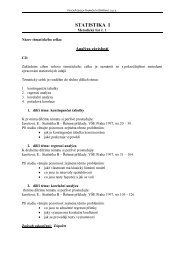
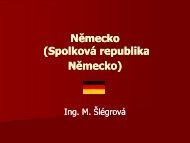
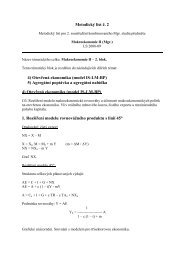
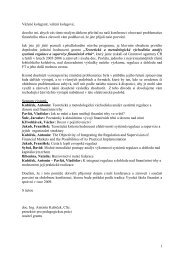

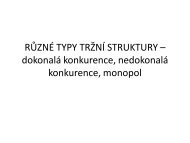

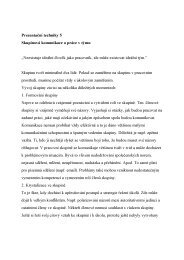
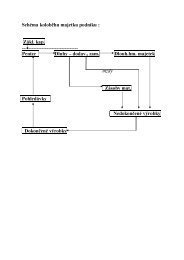
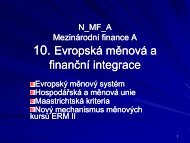
![(Microsoft PowerPoint - file [jen pro \350ten\355]) - IS VŠFS](https://img.yumpu.com/47456681/1/190x134/microsoft-powerpoint-file-jen-pro-350ten355-is-vsfs.jpg?quality=85)
